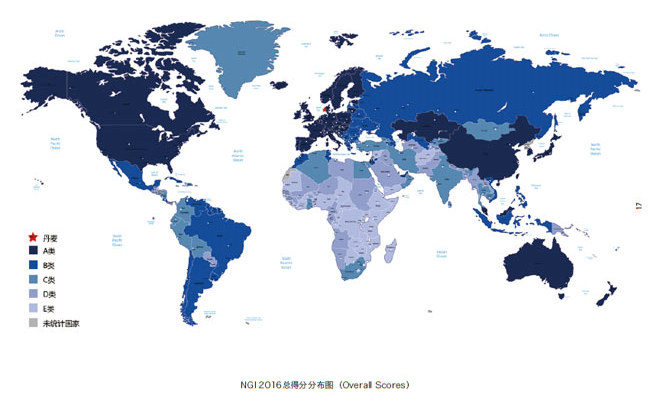


(Photo/Courtesy of the report "The Fundamental Dimensions of National Governance: China Perspective 2016 National Governance Index")
China ranked 28th on the latest international governance index ranking, making itself a unique presence among the developed countries on the index, according to a report issued in Shanghai on Jan. 8.
The report surveyed 192 countries across the globe, placing Denmark in the top position, followed by Finland and France. The U.K. and Germany came 12th and 7th respectively. China, meanwhile, came in 28th, close on the heels of the U.S. (26) and Canada (27).
At a press conference on Jan. 8, You Tengfei, a researcher with the team that assembled the index, pointed out that the top 30 countries mainly fall into two categories: developed and modern Western nations, such as the U.K. and the U.S., and countries with exceptional natural endowments or relatively small governance scales, such as Denmark and Singapore.
“China is an exception...It is the only developing country within the top 30 on the ranking that has a per capita GDP of less than $10,000, when the rest have per capita GDP of over $20,000. It is a remarkable and hard-won achievement for China, as a developing country with a vast territory and complex governance,” said You.
The report was published by the Political Science Institute of East China University of Political Science and Law (ECUPL) in Shanghai. The indicator system includes three primary indicators: fundamental, normative and sustainability. Together, these indicators evaluate countries on infrastructure and services, justice, innovation, environmental protection and more.
China ranked 60th according to the fundamental indicator, 37th by the normative indicator and 7th by the sustainability indicator, with an excellent performance in innovation.
“For a country with 1.4 billion people and 9.63 million square kilometers of territory, China’s inclusion in the top 30 must be contributed to its major infrastructure thrust proposed after the reform and opening up,” You noted.
“Any country’s governance process is like climbing a ladder: one must step firmly on each rung, especially developing countries like many in Africa. Some over-emphasize normative indicators such as justice and fairness when performance on more basic indicators like infrastructure and public service is still poor,” said Gao Qiqi, dean of the Political Science Institute of ECUPL and also project manager for the index.
It is this excessive focus on normative indicators by some Western countries that causes problems on the sustainability indicator, Gao noted.
The report proposes solving developing countries’ governance challenges from a Chinese perspective. The first priority is to set up a global infrastructure alliance and innovate on infrastructure investment and financing models; the second is to cooperate with international organizations and carry out construction with their support and material aid; the last is to coordinate financial input and design long-term programs.
“A country’s governance does not involve material progress, but progress on ideology. It should be noted that this governance index carries a distinctive Chinese flavor, but it will also resonate with other countries. The reason we propose our governance index is not to talk about ourselves, but to communicate with others,” said Ying Peili, Party chief of the ECUPL.
 Fire brigade in Shanghai holds group wedding
Fire brigade in Shanghai holds group wedding Tourists enjoy ice sculptures in Datan Town, north China
Tourists enjoy ice sculptures in Datan Town, north China Sunset scenery of Dayan Pagoda in Xi'an
Sunset scenery of Dayan Pagoda in Xi'an Tourists have fun at scenic spot in Nanlong Town, NW China
Tourists have fun at scenic spot in Nanlong Town, NW China Harbin attracts tourists by making best use of ice in winter
Harbin attracts tourists by making best use of ice in winter In pics: FIS Alpine Ski Women's World Cup Slalom
In pics: FIS Alpine Ski Women's World Cup Slalom Black-necked cranes rest at reservoir in Lhunzhub County, Lhasa
Black-necked cranes rest at reservoir in Lhunzhub County, Lhasa China's FAST telescope will be available to foreign scientists in April
China's FAST telescope will be available to foreign scientists in April "She power" plays indispensable role in poverty alleviation
"She power" plays indispensable role in poverty alleviation Top 10 world news events of People's Daily in 2020
Top 10 world news events of People's Daily in 2020 Top 10 China news events of People's Daily in 2020
Top 10 China news events of People's Daily in 2020 Top 10 media buzzwords of 2020
Top 10 media buzzwords of 2020 Year-ender:10 major tourism stories of 2020
Year-ender:10 major tourism stories of 2020 No interference in Venezuelan issues
No interference in Venezuelan issues
 Biz prepares for trade spat
Biz prepares for trade spat
 Broadcasting Continent
Broadcasting Continent Australia wins Chinese CEOs as US loses
Australia wins Chinese CEOs as US loses